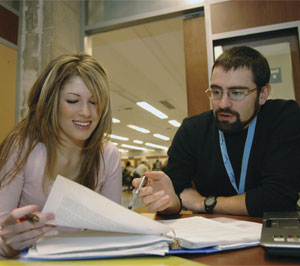 |
| First-year arts student Ashley Stead discusses her study routine with Chris Giacomantonio, a Masters of Sociology student and a study skills coach with the Studying for Success program. (Danny Abriel Photo) |
Ashley Stead’s exam preparations would not be complete without one essential thing: “an extra large tea.” Steaming cup in hand, the first-year arts student usually settles into studying about two weeks before her exams. “I'm not one of those people who start a month before ...I just don’t find it motivating to begin that early,” she says. “At the same time, I don’t like to cram at the last minute.”
She’s on the right track, according to experts. Patricia Schappert, academic advisor and coordinator of �鶹��ý’s Studying for Success Program, says students should make academics their highest priority two weeks before finals.
“Preparing for exams really should be a semester long process, and not something that you do the night before,” she says. “But about two weeks before exams, you should be trying to do as much work as possible, while balancing studies with sleep and time for other activities.”
Burning the midnight oil may be one strategy, but students who leave things to the last minute usually don’t end up getting the results they want.
“When you cram, you're storing information in short-term memory which means you are making very few connections to what you are actually trying to remember,” says Ms. Schappert. “Then when you're under stress, it's difficult to retrieve information and develop a coherent response when asked a question.”
She says while exam periods are an integral part of a student's academic life, they are about much more than grades. “Test taking is in large part about measuring and challenging your strategies for learning, which is a lifelong activity… The time you spend as an undergraduate is an apprenticeship for developing and honing these skills.”
��
The Studying for Success Program, part of Student Services and located in the Killam Library, provides one-on-one personal coaching sessions, or group workshops tailored to students’ fields of study. The coaches are graduate students who are trained to teach things like time management, note taking, critical reading and writing, and exam preparation.
�鶹��ý offers a range of other supports for students, from general study tips, to tutorials, to academic counselling. Dal's My Guide offers comprehensive information for students. The new Mark A. Hill Accessibility Centre offers a variety of services for students with permanent or temporary disabilities including exam accommodations, tutors referral, computers, adaptive software and hardware and a note-taking program.
LINKS: ��| ��| ��|
Exam tipsA week or two before exams:•��Make academics your highest priority in the weeks leading up to finals, but maintain a balanced schedule. Experts recommend dividing your time exactly between sleep, study and other activities (56 hours of sleep, 56 hours of academics, and 56 hours of other activities per week). While taking the exam:•��It sounds obvious, but make sure you put your name in your exam documents and that you label your answers to corresponding questions when using a separate booklet. |
